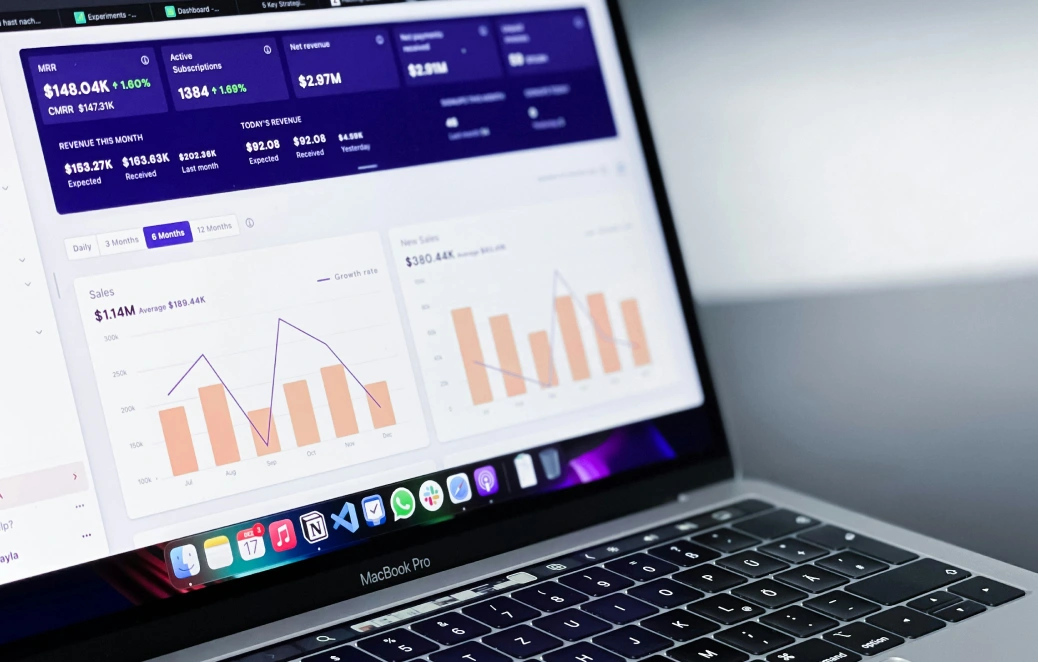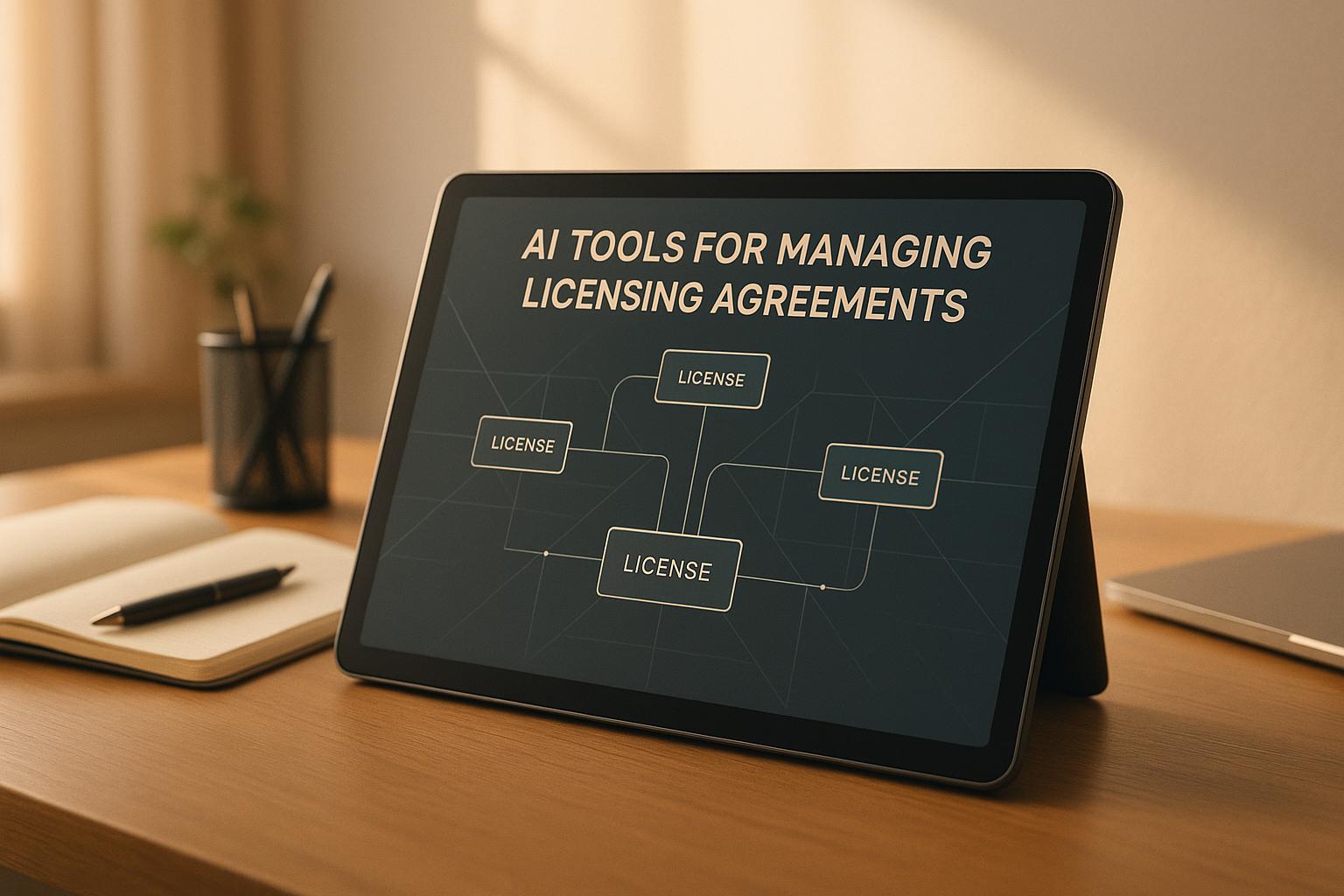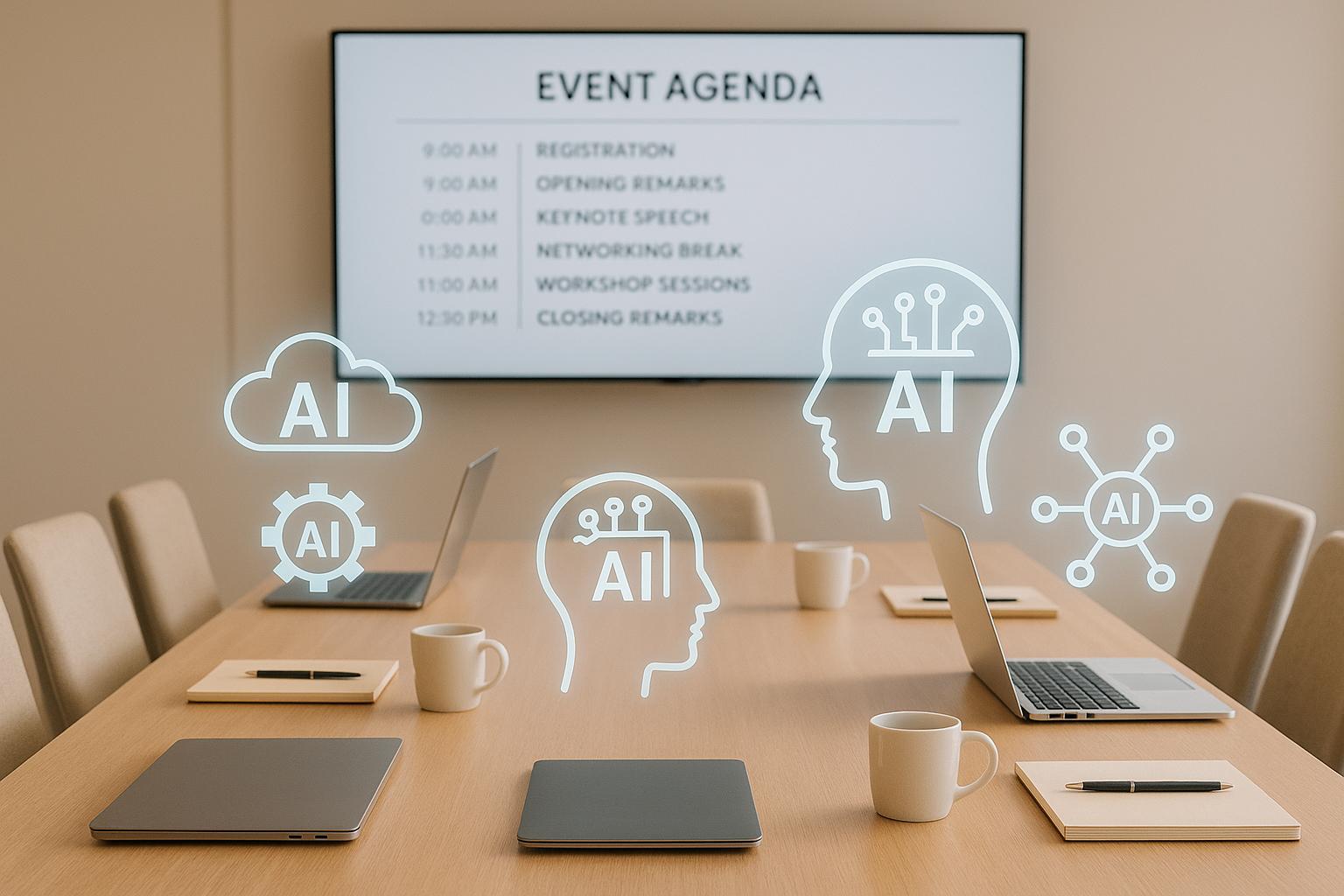Innovative AI In Corporate Event Planning

Chief Executive Officer
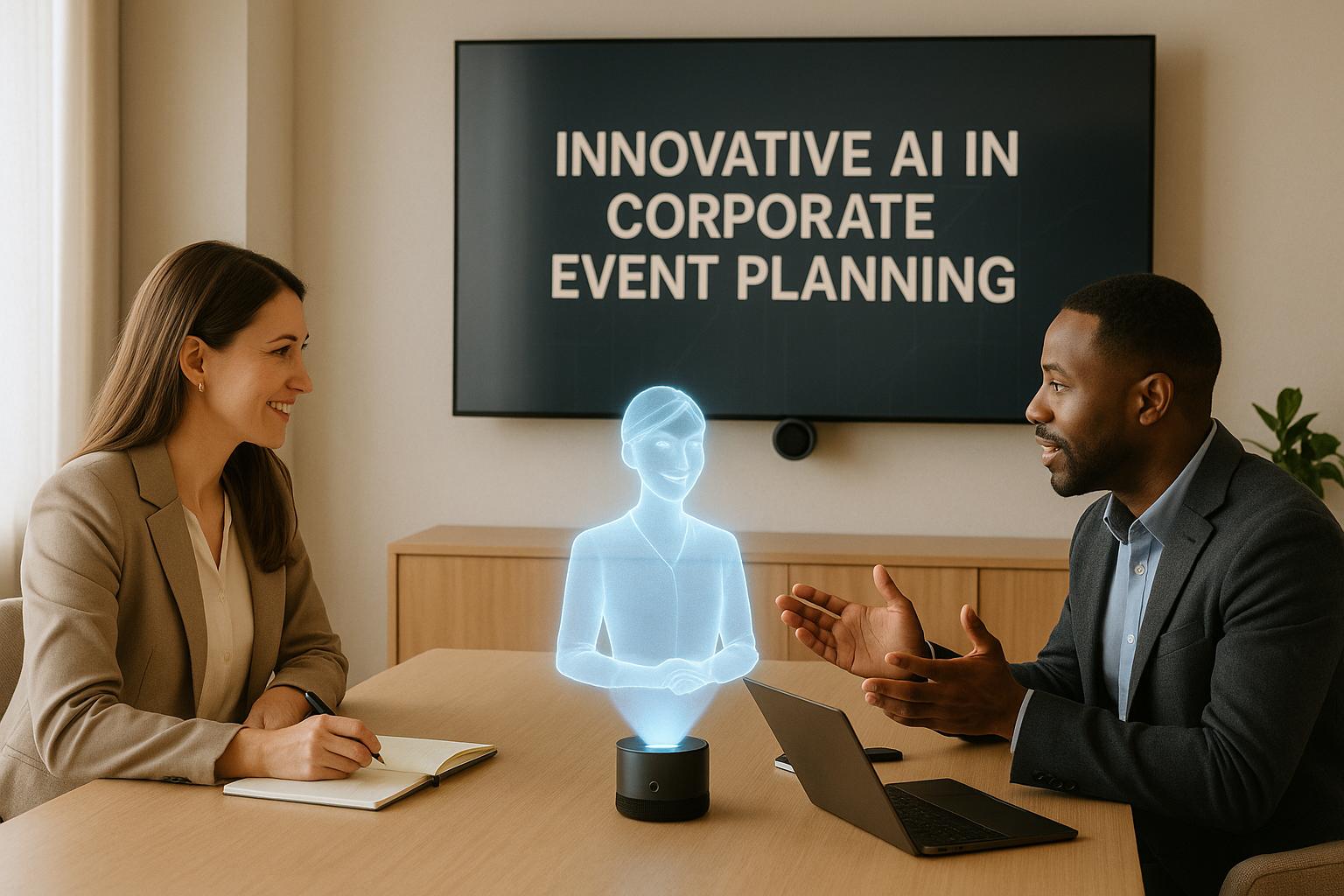
AI is transforming corporate event planning in the U.S., making processes faster, smarter, and more efficient. Here's how:
- Time-Saving Automation: AI handles scheduling, vendor matching, and communication, cutting down on manual tasks.
- Personalized Attendee Experiences: Tools analyze preferences to create custom agendas, boost engagement, and improve satisfaction.
- Cost Optimization: AI identifies savings opportunities, optimizes budgets, and predicts ROI with precision.
- Data-Driven Decisions: Post-event analytics deliver actionable insights to refine future events.
- Streamlined Communication: AI chatbots ensure 24/7 support, from pre-event invitations to post-event follow-ups.
Companies like Corporate Optics are leading the charge, integrating AI at every stage - from planning to execution. The result? Smarter decisions, better experiences, and more impactful events.
The AI Playbook for Event Professionals: Tools, Tactics & Transformation
Core Applications of AI in Event Planning
AI has transitioned from being a futuristic concept to a practical tool in corporate event planning. These technologies now handle time-consuming operational tasks, allowing planners to focus on the creative and strategic aspects of events. By automating complex processes, AI enables professionals to dedicate their energy to crafting memorable and impactful experiences. Let’s explore how AI enhances scheduling, vendor matching, and event logistics.
AI-Driven Scheduling and Agenda Management
Gone are the days of endless email threads and coordination headaches. AI-powered scheduling tools can analyze speaker availability, attendee preferences, and other variables to create optimized event schedules in no time.
Take the Cvent Attendee Hub, for instance. This platform uses machine learning to personalize session recommendations for attendees. As Cvent explains:
"Cvent Attendee Hub uses machine learning algorithms to recommend sessions for your attendees to attend based on their interests. It also recommends other attendees with whom they may like to network."
This tailored approach transforms events from generic gatherings into customized experiences. And when last-minute changes arise, AI tools can adapt schedules on the fly, ensuring everything runs smoothly without skipping a beat.
Venue and Vendor Selection
AI doesn’t stop at scheduling - it’s also revolutionizing how planners choose venues and vendors. By analyzing event requirements and matching them with relevant data, AI platforms streamline logistics and make decision-making faster and more accurate.
For example, Eventscribe by Cadmium simplifies the process by automating logistics, scheduling, and even speaker coordination. As highlighted:
"Key features of Eventscribe include: ... Automated logistics and scheduling ... Speaker and presentation coordination"
With tools like these, planners can save valuable time while ensuring every detail aligns perfectly with the event’s needs.
Improving Attendee Experience with AI
Modern AI systems have reshaped how corporate events are experienced by attendees. By analyzing preferences, behaviors, and interactions, AI delivers a personalized touch that makes every participant feel valued. This level of customization, once unimaginable at scale, now creates memorable and impactful experiences through intelligent analysis and real-time adaptation.
Personalized Event Recommendations
AI leverages registration details, past behaviors, and stated preferences to craft tailored agendas that enhance attendee engagement. These individualized schedules ensure participants get the most out of the event, with real-time adjustments boosting satisfaction by over 20%. From custom agendas to targeted emails and live session suggestions, AI ensures attendees receive relevant, meaningful content at every step.
A great example of this is from IMEX Frankfurt in 2024, where they used Snapsight to provide attendees with session summaries and insights. Integrated into their custom event app, this AI-powered note-taker allowed participants to access key takeaways immediately. This feature helped attendees review critical points, share highlights with colleagues, and dive deeper into topics of interest.
Tim Kitchell, a writer at NPU.co, captures this dynamic perfectly:
"AI isn't here to replace event planners, it's here to eliminate guesswork and raise the ceiling on what's possible."
By scaling these personalized touches, even events with thousands of attendees can make each individual feel recognized and valued. Alongside tailored agendas, AI further enhances the event experience through streamlined communication.
Streamlined Communication Using AI
Effective communication is essential for a smooth and enjoyable event experience, and AI tools are stepping in to make it seamless. AI chatbots now act as 24/7 virtual assistants, providing real-time schedule updates, instant answers, and session recommendations. These tools also handle pre-event invitations, live guidance, and post-event follow-ups, ensuring consistent, personalized communication throughout the event.
As Tim Kitchell wisely points out:
"Regardless of the AI systems you ultimately choose to use, be sure to keep the human element involved. While it can be an extremely useful tool, AI is far from error-proof. Regular content and performance spot checks are vital to ensuring proper functionality of your tools and keeping the attendee experience at a high level."
sbb-itb-ae35a94
Post-Event Analytics and Continuous Improvement
AI transforms raw event data into actionable insights, helping shape and refine future events. This ongoing analysis ensures that the impact of an event extends well beyond its conclusion, building on earlier AI-driven engagement efforts.
AI-Powered Event Performance Analysis
AI has redefined how we evaluate events by processing massive datasets to uncover meaningful trends and insights. These systems can analyze attendee behavior, engagement metrics, session popularity, and networking activities to produce detailed performance reports - far more comprehensive than traditional feedback surveys.
When it comes to financial outcomes, AI provides a clearer picture by calculating precise ROI metrics. Instead of relying on rough guesses, AI incorporates data like attendee engagement levels, lead generation, and conversion rates to identify which parts of the event budget delivered the most value.
AI also bridges the gap between survey responses and behavioral data to uncover patterns in attendee satisfaction. For instance, it might reveal that attendees who participated in specific networking sessions reported higher satisfaction levels. These insights can guide future decisions, such as optimizing the schedule to include more of what works.
Data-Driven Improvements for Future Events
The insights provided by AI analytics don't just summarize past events - they offer a roadmap for making future ones better. By analyzing historical data, AI systems can highlight what worked well and recommend strategies to improve attendee experiences and business outcomes.
For example, AI might identify that interactive workshops consistently generate higher engagement than traditional lectures. It could also recommend venue layouts that encourage more meaningful connections or suggest session formats that align with attendee preferences.
Predictive modeling is another powerful tool, especially for budget planning. AI can forecast which investments - like specific marketing efforts or speaker choices - are likely to deliver the best returns based on past performance. This allows event planners to allocate resources more effectively.
AI also enhances speaker selection and content planning. By analyzing audience preferences, it can recommend speakers whose expertise matches attendee interests, predict ideal session lengths, and propose themes that are likely to resonate. Seasonal and demographic trends, such as peak attendance times or preferred communication styles, further help planners tailor every detail to meet their audience's needs.
Compliance with U.S. Privacy Regulations
As event analytics become more data-driven, protecting attendee privacy is essential. Adhering to U.S. privacy laws, including the California Consumer Privacy Act (CCPA), is a critical part of using AI responsibly.
One key principle is data minimization - collecting only the information needed for legitimate business purposes. Event planners should clearly define which data points are necessary for improving events and avoid gathering unnecessary details.
Transparency is equally important. Attendees need to know what data is being collected, how it will be used, and what insights will be generated. Providing this information builds trust and ensures compliance with laws requiring informed consent.
Organizations must also establish clear data retention policies. AI systems should have the capability to delete attendee information permanently upon request and provide data portability, allowing individuals to access copies of their personal data.
Strong security measures are non-negotiable. Data should be encrypted both in transit and at rest, with strict access controls and audit trails in place to monitor usage. Regular security assessments ensure that protections evolve alongside AI advancements.
Finally, working with AI vendors who understand U.S. privacy regulations can simplify compliance. Event planners should choose platforms with built-in privacy controls, automated consent management, and robust compliance reporting tools to stay on the right side of the law while safeguarding attendee trust.
Corporate Optics: AI-Powered Solutions for Event Production

Corporate Optics is a shining example of how AI is reshaping the way corporate events are planned and executed. Based in the United States and led by Emmy Award-winning founder Steven P. Simmons, the company has evolved from offering traditional audiovisual services to becoming a leader in AI-driven event production. Their approach integrates artificial intelligence at every stage, from initial planning to post-event analysis, ensuring seamless execution for events of all sizes - whether it’s a small C-suite meeting or a large-scale shareholder event.
End-to-End Event Planning with AI
Corporate Optics takes a comprehensive approach to event production, weaving AI into every phase of the process to boost efficiency and simplify complex tasks. Their planning process includes AI-assisted tools that refine agendas, ensuring sessions are well-structured and content aligns with the event’s goals. AI also plays a role in coordinating speakers by automating scheduling and resource allocation, making rehearsals and setups more efficient.
For live-streamed events, AI ensures top-notch audiovisual quality, adjusting settings in real-time to maintain a professional broadcast. Venue selection and vendor coordination are also streamlined, with AI matching event requirements to the best-suited locations and service providers.
Tailored Solutions for Every Event
Corporate Optics recognizes that no two events are the same. To meet the diverse needs of their clients, they’ve developed a flexible service model with three key tiers:
- Basic AV Support: Focused on essential audiovisual services, this tier ensures optimized lighting and sound for straightforward events.
- Comprehensive Event Management: Ideal for more involved productions, this option integrates AI to assist with budget planning, registration tracking, and risk management.
- Custom Event Production: Designed for high-stakes events like multi-day conferences or broadcast productions, this premium service handles everything from security coordination to catering logistics.
Each client receives a detailed consultation to ensure pricing reflects the specific complexity and requirements of their event.
Collaboration with Prompts.ai
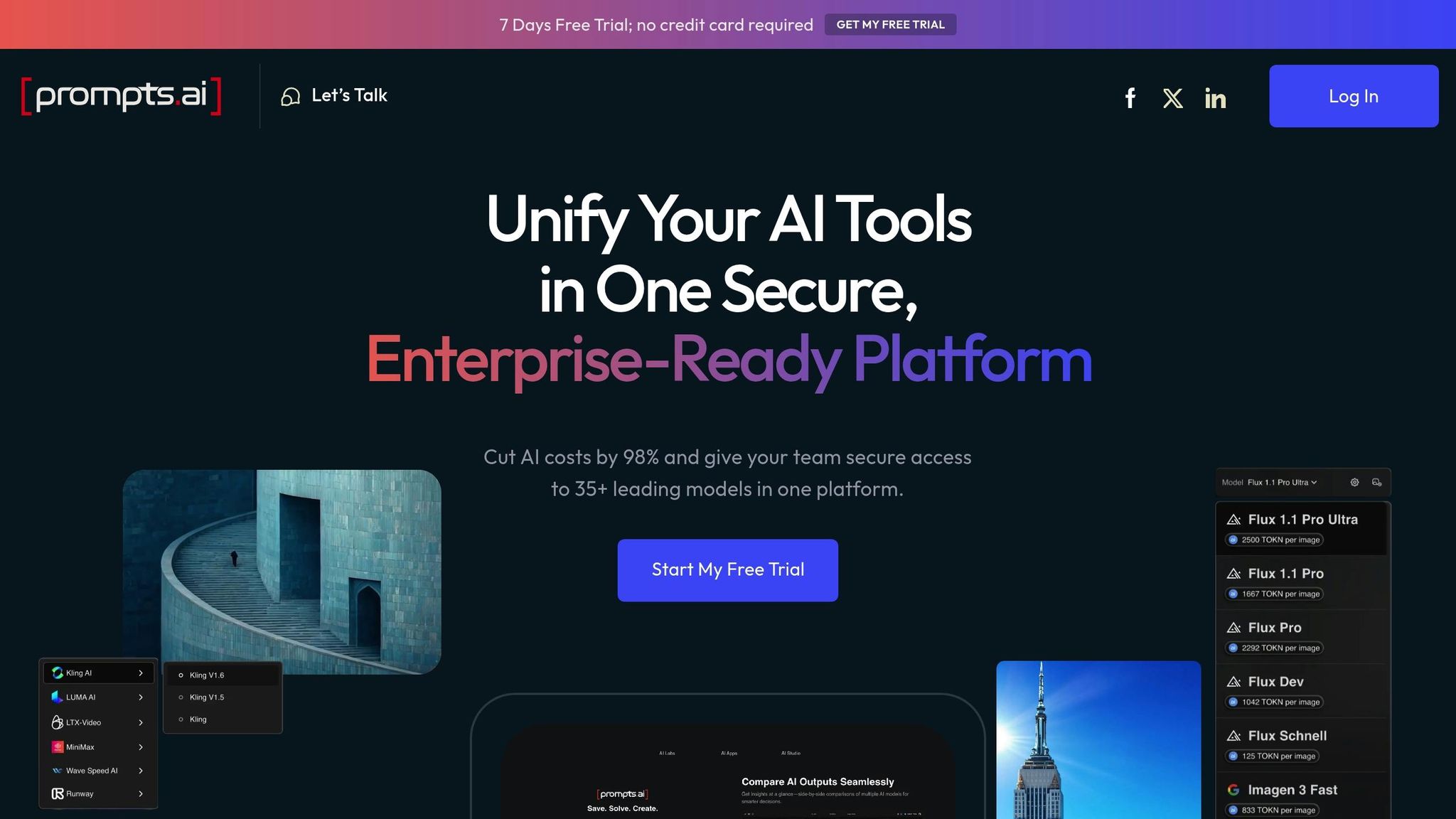
Corporate Optics has also partnered with Prompts.ai, a cutting-edge platform that enhances efficiency in corporate events and communications. This partnership underscores their dedication to delivering technology-forward solutions. By leveraging AI, Corporate Optics not only simplifies event logistics but also sets the stage for the future of corporate event production.
The Future of Event Planning with AI
AI is reshaping how corporate events are planned, executed, and evaluated. As technology evolves, event planners who adopt these tools gain the ability to create events that are not only more efficient but also more engaging and impactful. Looking ahead, AI promises to push these boundaries even further.
One of AI's standout contributions is its ability to process massive amounts of data to guide decision-making. By analyzing historical event data, attendee feedback, and market trends, AI provides planners with actionable insights. These insights help in making smarter choices - like selecting the right venue, forecasting budgets with precision, and designing event formats that truly connect with the intended audience.
Personalization also takes center stage with AI. By predicting attendee behavior and curating dynamic content, AI ensures that each participant's experience feels tailored to their preferences. This level of customization not only boosts engagement but also leaves attendees with a lasting positive impression.
AI's real-time capabilities are another game-changer. Advanced systems can monitor audience reactions and environmental factors during an event, adjusting elements like lighting and sound on the fly. This eliminates the need for manual tweaks and ensures the event runs smoothly from start to finish.
The integration of AI with technologies like augmented reality and advanced analytics is also transforming hybrid and virtual events. These innovations allow planners to seamlessly blend in-person and remote participation, creating cohesive experiences that feel natural for all attendees while expanding the event's reach.
When it comes to resource management, AI is proving invaluable. By analyzing patterns in vendor performance, attendee behavior, and resource use, it helps planners make smarter spending decisions. This not only reduces waste but also enhances the overall impact of the event.
At Corporate Optics, we leverage AI to enhance both the creative and operational sides of event planning. AI isn't just about automating tasks - it’s a tool that opens up new creative possibilities and helps us deliver experiences that go above and beyond client expectations.
As the U.S. corporate event industry evolves, organizations that embrace AI-driven solutions will be better prepared to meet shifting attendee needs, handle complex logistics, and achieve meaningful business results. At its core, AI isn't here to replace human creativity; it’s here to amplify it, empowering event planners to reach new heights of innovation and expertise. The future of event planning belongs to those who see AI as a partner in creating extraordinary experiences.
FAQs
How does AI improve personalized experiences for attendees at corporate events?
AI is transforming corporate events by offering personalized experiences that cater to individual preferences and behaviors. By analyzing data, it can recommend sessions, activities, and networking opportunities that align with each attendee's interests. This level of customization ensures participants engage with content and connections that matter most to them, leading to higher satisfaction.
With advanced tools, AI can go a step further by creating custom agendas, suggesting live session options, and enabling smarter matchmaking. This helps attendees build meaningful connections while staying engaged with the event. For organizers, these tailored experiences not only enhance attendee enjoyment but also deliver a stronger return on investment.
How does AI help reduce costs and improve ROI in corporate event planning?
AI is transforming corporate event planning by taking over tedious tasks like scheduling, managing vendors, and tracking budgets. This not only saves time but also reduces the chances of human error, making the entire process more efficient.
On top of that, AI-powered analytics offer insights into what attendees want and how they behave. With this information, planners can design events that feel more personalized and engaging. By tailoring event elements to the right audience, businesses can improve attendee satisfaction and get more value out of their investment.
Another perk? AI tools can track expenses in real-time and even suggest ways to cut costs, helping events stay on budget without sacrificing quality. These tools make it easier to allocate resources wisely and make smarter decisions throughout the planning process.
How can event planners comply with U.S. privacy laws when using AI tools for analytics?
To align with U.S. privacy laws like the California Consumer Privacy Act (CCPA), event planners need to emphasize transparency in how attendee data is collected and utilized. This means offering clear, straightforward explanations during the registration or ticketing process to ensure attendees understand what’s happening with their information.
Regular audits of AI systems are a must to confirm they handle personally identifiable information (PII) and sensitive data properly, adhering to both federal and state regulations. It’s also important to provide attendees with opt-in and opt-out choices for data collection and stay informed about changes in privacy laws, especially those affecting AI technologies.
By adopting these measures, event planners can responsibly leverage AI tools, protect attendee privacy, and ensure they remain compliant with legal requirements.
Related Blog Posts
